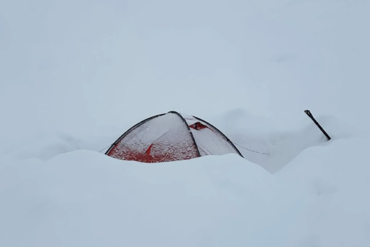As a high-tension wire inspector, Timothy Phillips’ job description is electrifying.

Phillips, 49, starts his day sitting on a three square foot platform attached to a helicopter’s landing skids. Hovering over 100-ft above the ground, Phillips transfers his body to a pair of narrow power transmission wires. More than 500,000 volts of electricity flows through them.
It’s a high-stakes ballet as he balances his body and tools, and monitors the position of the helicopter. His vigilance must be constant.
“Just don’t look down. If you spend your time thinking about the worst case scenario it’s going to be a miserable day. When the wind gusts get squirrelly or the clearances between the helicopter and the wires get a little tight, I stay focused. There is nothing in front of me but the work,” he said.

Maintaining High Voltage Wires
Phillips lives in Penticton, British Columbia. As an independent contractor, he works on high wire inspection projects across North America. Traveling the country to inspect, repair, and maintain the more than 450,000 miles of high voltage power lines that crisscross the United States, he works closely with the helicopter pilots that transport him to his work station high above the ground.
“On any job you get into a routine where everyone is anticipating each other’s moves. It’s critical for a lineman to do everything in the same order job by job so when the helicopter pilot sees you reaching out with your right hand he knows why you are reaching out and he can move the helicopter to help you do your job,” explains Phillips.
Phillips starts his day at 7 a.m. He may come down off the lines for lunch, then he’s back up until the light starts to fade and the helicopter pilot admonishes him that it’s time to call it a day. Watching a video of a line inspector in action, the job is awe-inspiring.
High above the ground, clipped into a safety harness, and wearing a Nomex protective suit, Phillips moves steadily hand over hand along parallel power lines. Step by step, he inspects wires through a real-world high-wire act. Along the way, he repairs insulators and replaces rusted or broken connectors.
Focus On The Work
Hyper-focused on the job at hand, Phillips also keeps an eye out for potentially fast-changing weather conditions. Gusting winds, rain, or thunderstorms can make the already dangerous power line-to-helicopter maneuver more hazardous.
How does he manage the fear?
“Consider walking the length of a 2×4 board. If the board is on the ground, 99 percent of people could accomplish the task. Raise the board six inches off the ground and the number of successful crossings drops to 75 percent. Raise it another foot, two feet, three feet off the ground and the number of success drops fast. If you let your head get in the way, you’re screwed. Respect the work, the danger, the wind, the crew experience level, and the situation you’re in. Respect all of this with a healthy life-preserving fear. But, then, focus on the work.”
Flying Near Wires
Helicopter pilots are normally taught to avoid high tension wires and drilled constantly in maintaining appropriate speed and altitude conditions so there’s a safety margin if something goes wrong. As a high tension wire inspection team, the job description requires getting close to the wires and pushing those speed and altitude limits.
“When you do what we have to do every day.” he said “We’re not going to get the job done without getting close to the wire.”

Phillips recalls a situation when an improperly attached tool bag unclipped from a high tension wire and fell to the ground below.
“No one was hurt but the mistake reminded me how quickly things can go bad after a moment of inattention,” he said. “If something happened with the helicopter the incident would be over before you would be even conscious of it.”
Accidents leading to serious injuries and fatalities are part of the profession’s legacy. Surprisingly, the salaries of high tension line inspectors are similar to those earned by workers who spend their day on the ground or in a lineman’s bucket truck.
“There is an ego appeal. You are doing a job that in very real terms very, very few people have ever done or ever could,” Phillips said. “You don’t make more money working off the side of a helicopter, you just get the bragging rights.”
Looking for a job like this? Our new site highlights some of the toughest, most extreme (and best) jobs on Earth.
–Epic Occupations content is sponsored and presented in collaboration with YETI.







